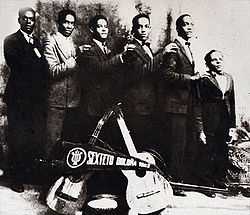Alfredo Boloña
Alfredo Bologña Jiménez (Havana, December 24, 1890[1] – 1964)[2] was a Cuban musician who played a role in the early development of the son.
Bologña played the marimbula, the bongó and the guitar at different times and, despite his physical limitations (dwarfism), he was a force in Cuban music for half a century. In 1910 he was already a figure of note in Havana, a member of the Los Apaches choral group and of the Trio Oriental, with Guillermo Castillo (guitar) and Carlos Godinez (tres). In 1915 Boloña formed a son group in Havana called Agrupación Bologña, with Hortensia Valerón (vocalist), Manuel Menocal (tres), Manuel Corona (guitar), Victoriano Lopéz (maracas) and Joaquín Velasquéz (bongó).[3]
In October 1926 his Sexteto Boloña recorded in New York a set of numbers for Columbia Records which is available today on the usual media.[4] The line-up for these recordings was, L>R in photograph: José Vega Chacón (guitar, 2nd voice), unknown (maracas, 1st voice), José Manuel Incharte 'El Chino' (bongó), Abelardo Barroso (sonero, claves), 'Tabito' (double bass), Alfredo Boloña (tres, leader).

The group split up in 1935. Bologña's compositions included Güagüina yirabo, Riquieza en flor, A la permanente, Aurora en Pekin, Dame un besito and Te espararé en la retreta.[5]
- ↑ 1 Birth Certificate of Alfredo Boloña Jimenez. Book 2, Page 303. Vedado Civil Registry, Havana, Cuba.
- ↑ so given in Giro Radamés 2007. Diccionario enciclopédico de la música en Cuba. La Habana. vol 1, p147. Orovio, Helio 1981. Diccionario de la música cubana. La Habana. p53 gives 1890 as date of birth.
- ↑ Orovio, Helio 2004. Cuban music from A to Z.
- ↑ for instance, La historia del son cubano: Sexteto Boloña, the roots of salsa vol 1. Arhoolie/Folklyric LP 9053. Also Tumbao TCD 060 Sexteto Boloña: Echale candela 1926.
- ↑ Rodríguez, Ezequiel 1967. Obras del repertorio del Septeto Bologña. La Habana.